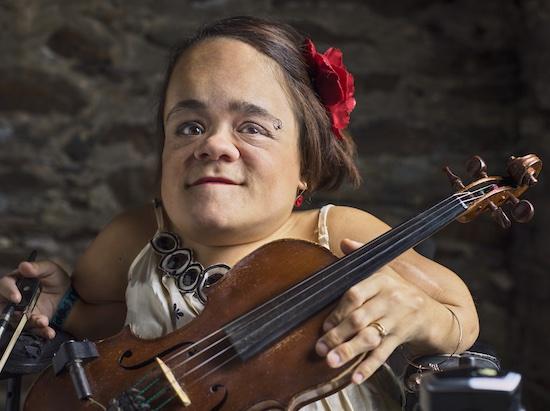Careers in the Arts Toolkit Artist Profile: Gaelynn Lea

Photo by Paul Vienneau
Violinist and Vocalist, Musician, Composer, Public Speaker, and Disability Advocate
Duluth, MN
Gaelynn Lea is a violinist and vocalist from Minnesota who, after winning NPR Music’s Tiny Desk Contest in 2016, began touring and sharing her unique style of music across the globe. “My husband and I took some time off from our jobs, sold our house, bought a van, and hit the road!” she said. Since winning the Tiny Desk Contest, Lea has played more than 500 shows in 45 states and seven countries. “I never imagined that I would travel this much, but it has been an amazing experience...I am lucky that I get to do something I'm passionate about every day. Traveling and performing is a lot of work, but it is still a dream come true.”
Most recently, she composed the music for the Broadway production of Macbeth, starring Daniel Craig and Ruth Negga. It was nominated for three Tony Awards, including Best Sound Design. She is also a co-founder of a change-making group called RAMPD - Recording Artists and Music Professionals with Disabilities. RAMPD’s mission is to serve as a resource for disabled recording artists and music professionals and their allies by amplifying disability culture, promoting inclusion, and advocating for accessibility in the music in history.
Described as “Velvet Underground meets Little House on the Prairie” by musician Jeremy Ylvisaker, her music was initially beautiful and simplistic—just her voice, violin, and a looping pedal. Her newest album, released in 2018 and her third to date, takes a step past this and incorporates local Minnesotan heavy-hitters—including Al Church, Dave Mehling, Marty Dosh, Andrew Foreman, and Alan Sparhawk—to shift the sound around from folk to pop to even some traditional fiddle tunes. In addition to performing and recording, Lea also does speaking engagements about disability rights, finding inner freedom, and the power of music.
Growing up in Duluth, Minnesota with her parents and three siblings, Lea was born with Osteogenesis Imperfecta, otherwise known as brittle bones disease. This means Lea’s bones aren’t as strong as most people’s, so she has been using a wheelchair since she was two-and-a-half. At the age of nine, she watched an orchestra perform at school and fell in love with the sound of the strings. The next year, her fifth-grade orchestra teacher helped her adapt so that instead of playing the violin on the shoulder, she played it upright like a tiny cello. Lea has been playing this way for 25 years.
Lea uses her music to talk about topics like love, sorrow, being in the moment—and her disability. “Having brittle bones means that one-minute life can be going along swimmingly, and the next minute you break a bone and are pretty much laid up for six weeks,” she said. “This teaches you about impermanence and even your own mortality at a pretty young age, and I know it's colored my songwriting.”
Being a wheelchair user and performing artist has given her perspective on how inaccessible venues are. “Often venues are not accessible to me or to the paying customers with disabilities, which limits the places I can perform and thus earn my keep,” she said. “I used to be more flexible about accessibility and I would do shows at venues where I had to be lifted onstage and such. But about a year ago I finally took a stand and said I would only play in spaces with accessible entrances, bathrooms, and that I wouldn't have my chair lifted on stage. I think lifting my chair sends a negative message—that there's not truly equal access for disabled artists.”
Lea wants to leave a legacy of “kindness, love, and joy—especially among those who know me best. But I would also love to leave a lasting contribution in music, writing, and disability culture.” She plans to continue to challenge herself to make music that tells authentic stories and maybe even write a book one day.
When it comes to changing disability culture, Lea said that “Instead of promoting the medicalized version of disability (focusing on the ‘otherness’ or physical differences more than the whole person), we want disability to be viewed as you would any other form of diversity. Not positive or negative, not sensationalized or to be pitied, but just a part of our identity.”

